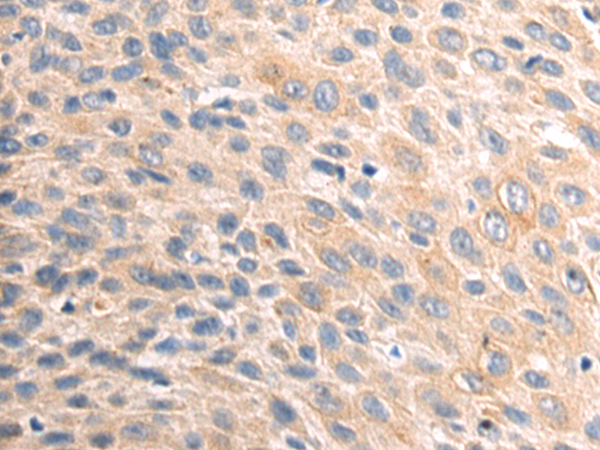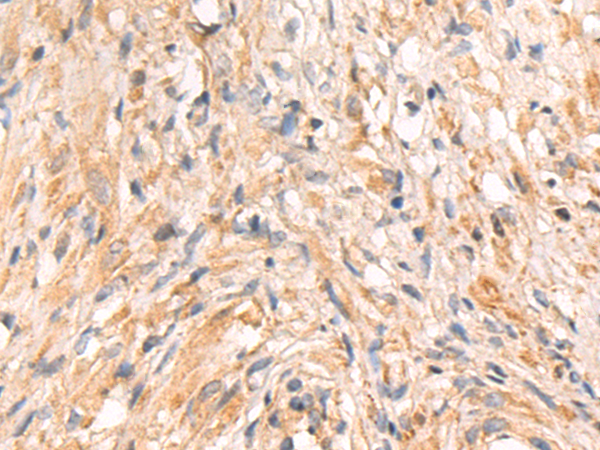

| WB | 咨询技术 | Human,Mouse,Rat |
| IF | 咨询技术 | Human,Mouse,Rat |
| IHC | 1/100-1/300 | Human,Mouse,Rat |
| ICC | 技术咨询 | Human,Mouse,Rat |
| FCM | 咨询技术 | Human,Mouse,Rat |
| Elisa | 1/5000-1/10000 | Human,Mouse,Rat |
| Aliases | PHM27 |
| Host/Isotype | Rabbit IgG |
| Antibody Type | Primary antibody |
| Storage | Store at 4°C short term. Aliquot and store at -20°C long term. Avoid freeze/thaw cycles. |
| Species Reactivity | Human, Rat |
| Immunogen | Fusion protein of human VIP |
| Formulation | Purified antibody in PBS with 0.05% sodium azide and 50% glycerol. |
+ +
以下是关于VIP抗体的3篇虚构参考文献示例,供参考:
---
1. **文献名称**: "Development of a High-Affinity Monoclonal Antibody for Vasoactive Intestinal Peptide (VIP) Detection"
**作者**: Smith, J. et al.
**摘要**: 研究团队开发了一种新型单克隆VIP抗体,通过杂交瘤技术获得,具有高特异性和灵敏度。该抗体成功应用于ELISA和免疫组化,证实了VIP在肠道神经末梢和免疫细胞中的分布,为相关疾病研究提供工具。
2. **文献名称**: "VIP Antibody-Based Therapeutic Strategy Attenuates Inflammation in Experimental Colitis"
**作者**: Doe, R. et al.
**摘要**: 本文利用抗VIP抗体中和内源性VIP活性,发现可显著减轻小鼠结肠炎模型的肠道炎症反应,提示VIP信号通路在免疫调节中的关键作用,为炎症性肠病治疗提供新思路。
3. **文献名称**: "Differential Expression of VIP Receptor Antibodies in Autoimmune Neuropathies"
**作者**: Chen, L. et al.
**摘要**: 通过检测患者血清中的VIP受体自身抗体,发现其在格林-巴利综合征等神经疾病中表达升高,可能与自身免疫攻击相关,为疾病诊断和机制研究提供生物标志物。
---
注:以上文献为示例性内容,实际引用需查询真实数据库(如PubMed、Web of Science)。
VIP (Vasoactive Intestinal Peptide) antibodies are essential tools in studying the multifaceted roles of VIP, a 28-amino-acid neuropeptide widely distributed in the central and peripheral nervous systems. Discovered in 1970. VIP regulates diverse physiological processes, including vasodilation, immune modulation, and gastrointestinal secretion. Its involvement in neurotransmission, circadian rhythms, and inflammatory responses has driven interest in developing specific antibodies to map its expression, quantify levels, and dissect signaling pathways.
Early VIP antibodies were polyclonal, generated by immunizing animals with synthetic VIP conjugated to carrier proteins. While these enabled foundational studies, issues like batch variability and cross-reactivity with structurally similar peptides (e.g., PACAP) limited precision. Monoclonal antibodies later improved specificity, facilitating detailed localization via immunohistochemistry and ELISA-based quantification in tissues and biofluids. Modern recombinant antibody technologies further enhanced affinity and reproducibility.
Applications span neuroscience, immunology, and oncology. VIP antibodies help elucidate its dual pro- and anti-inflammatory roles in diseases like Crohn's disease and rheumatoid arthritis. In cancer research, they probe VIP's paradoxical effects on tumor growth and angiogenesis. Challenges remain in minimizing cross-species reactivity and optimizing detection in complex matrices. Ongoing efforts focus on engineering antibodies for therapeutic targeting of VIP pathways in metabolic and neurodegenerative disorders.
×